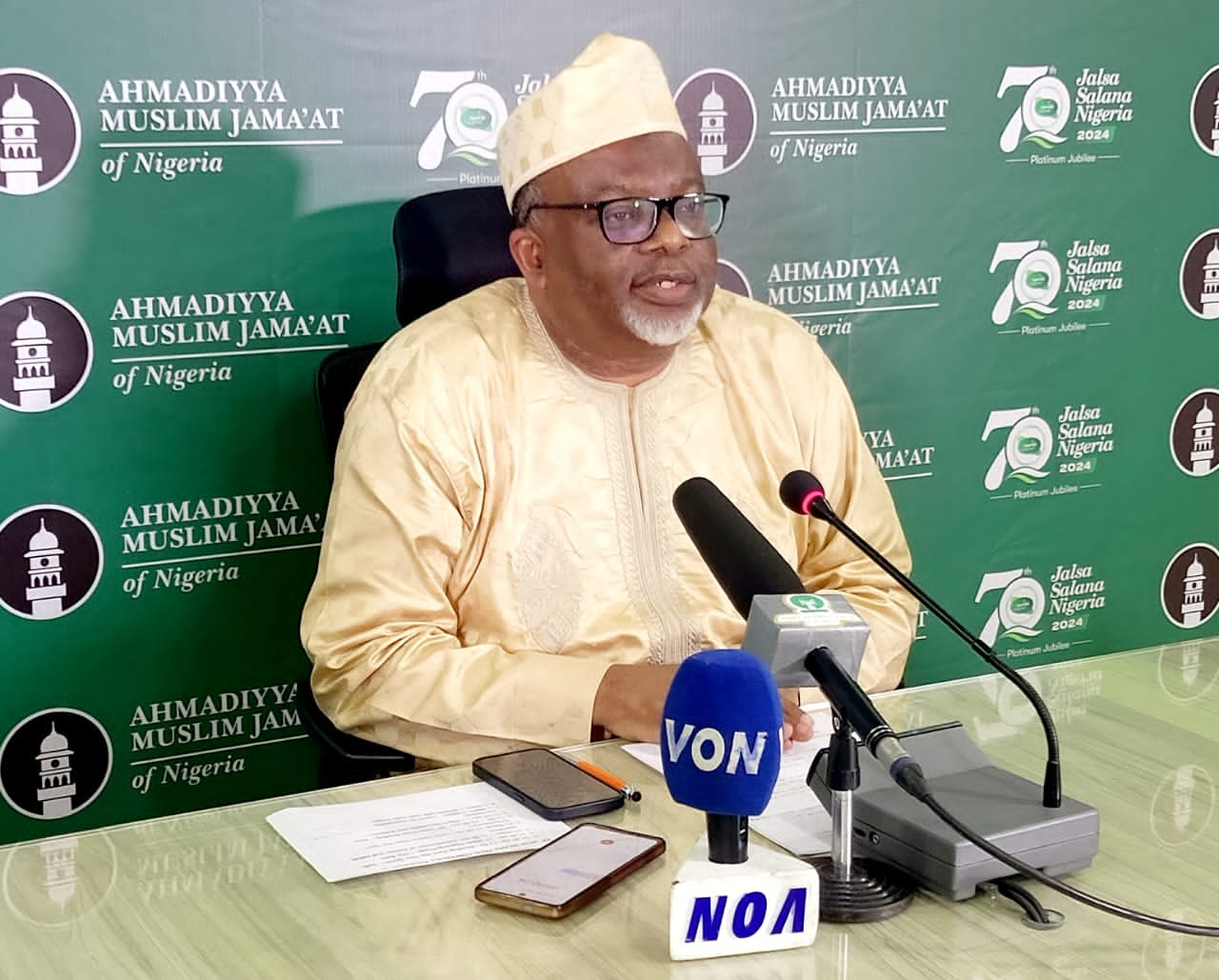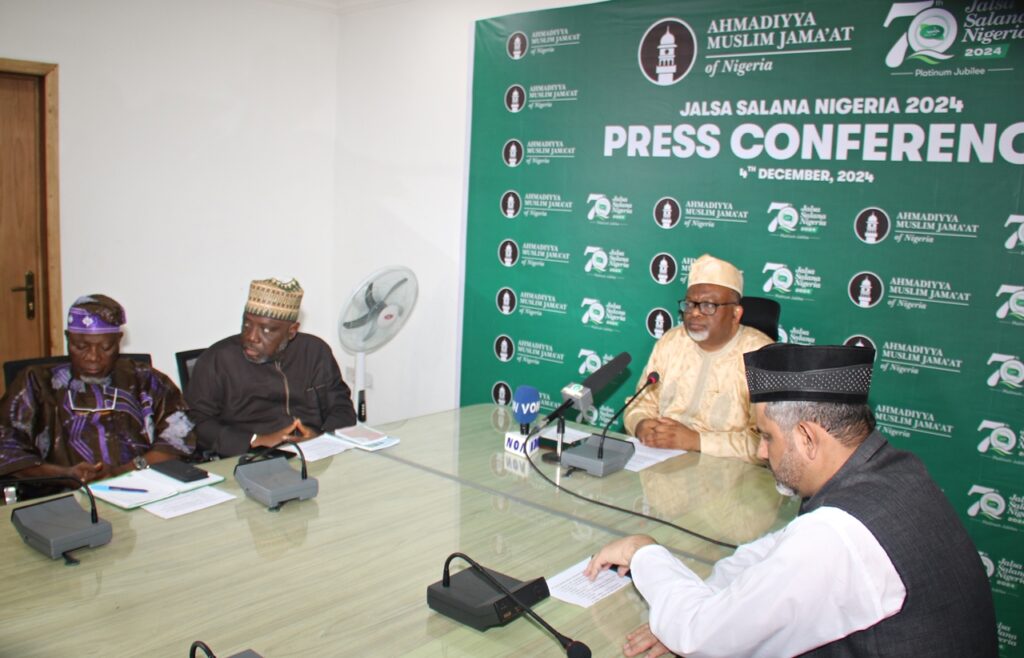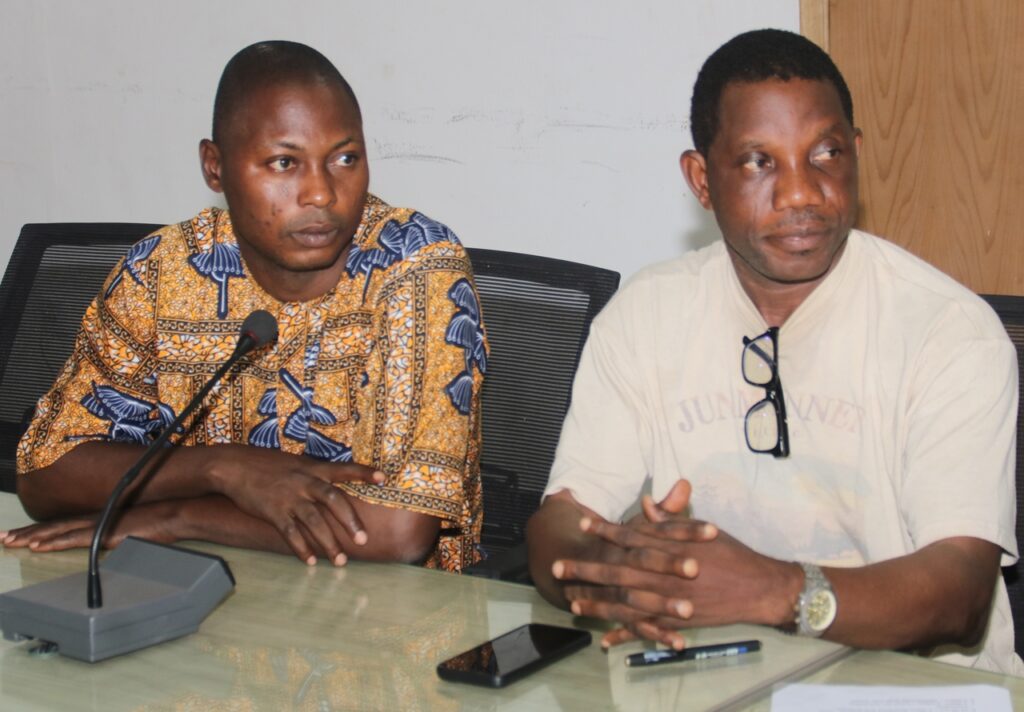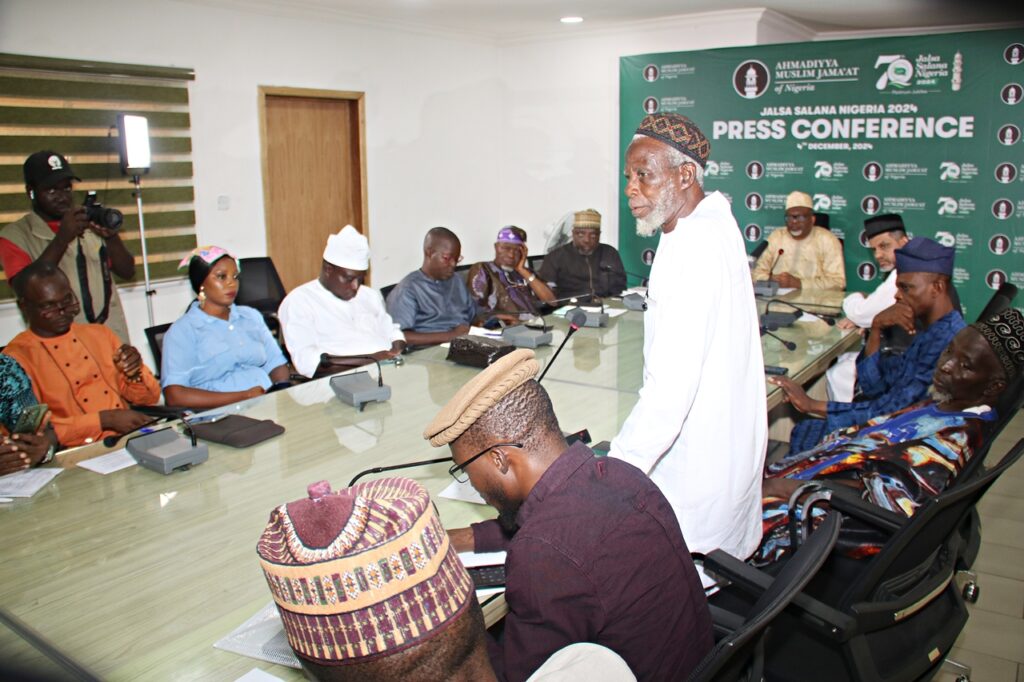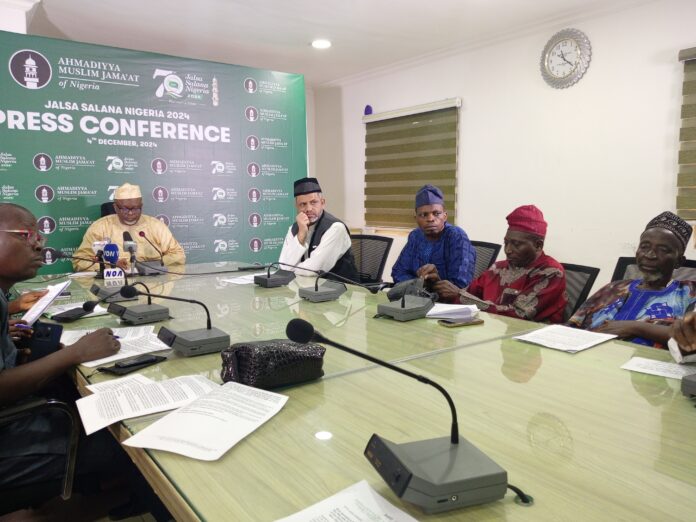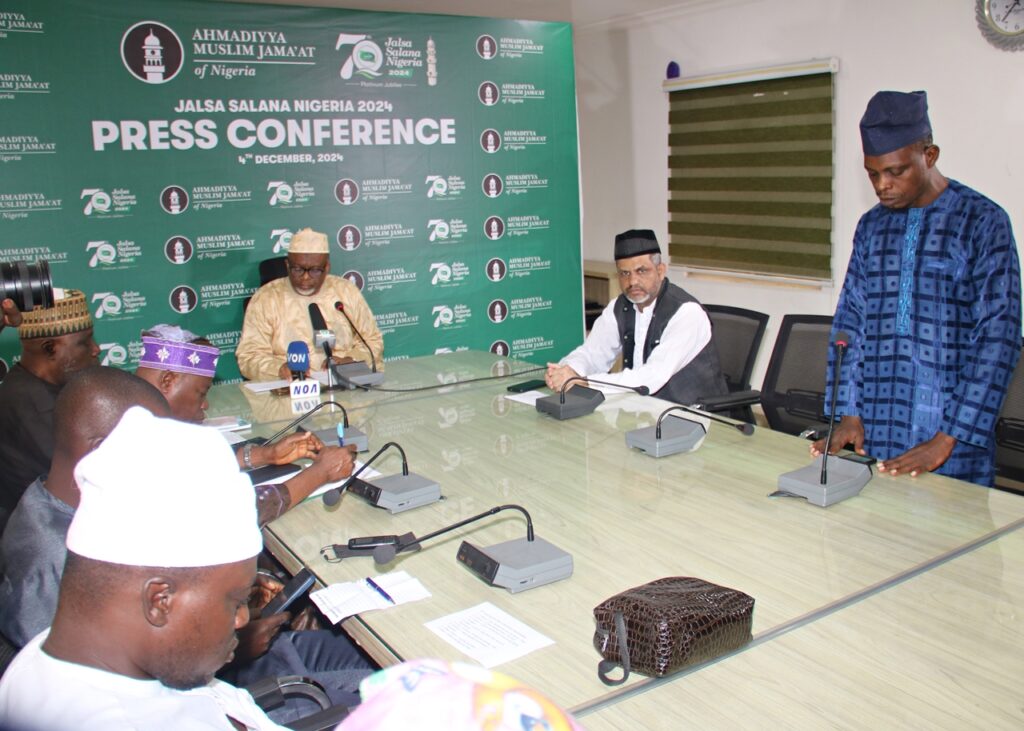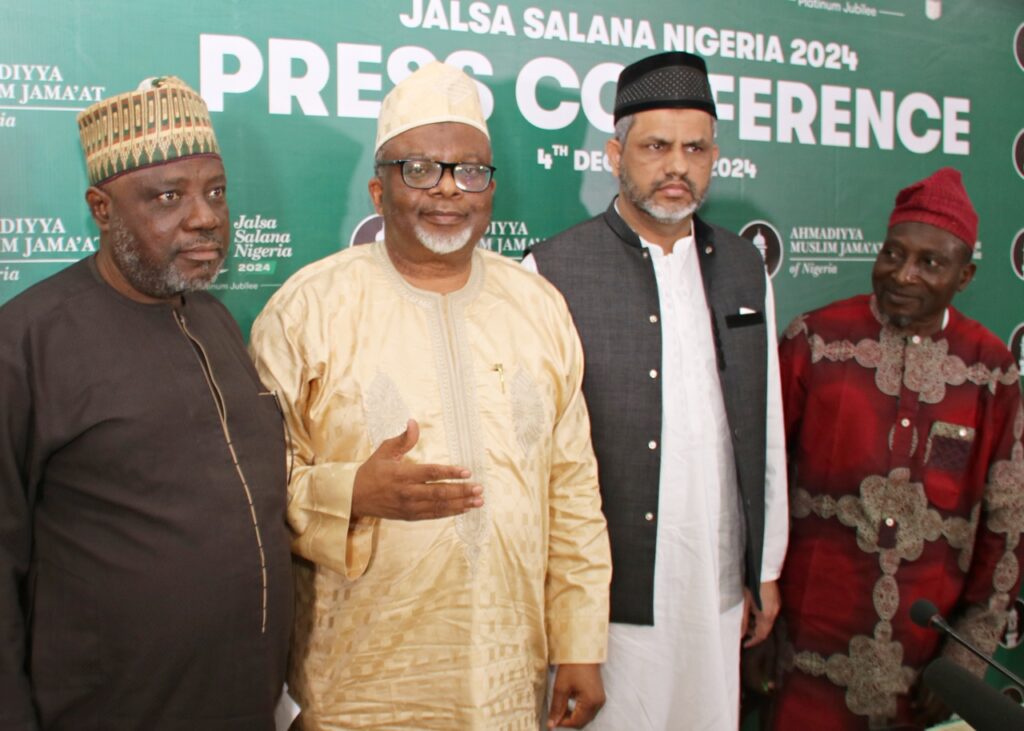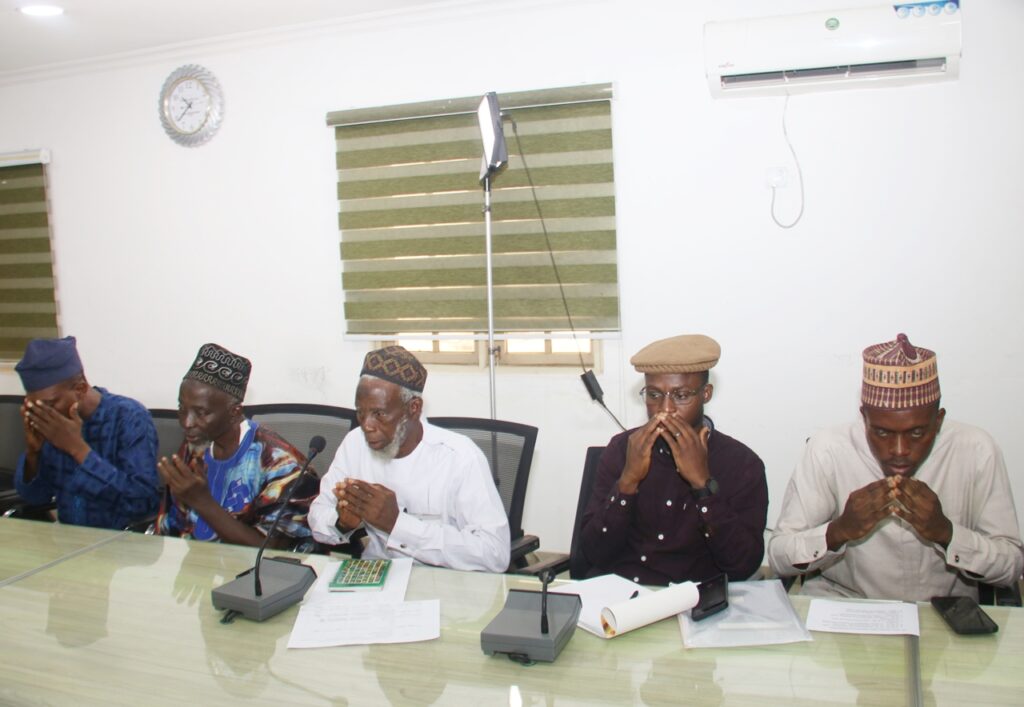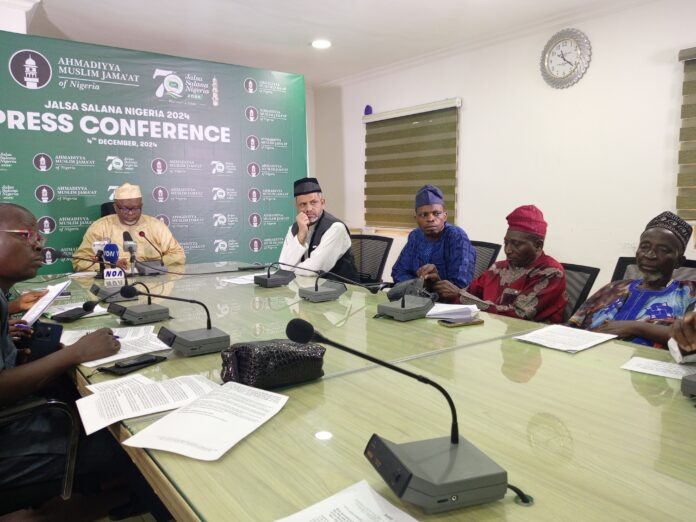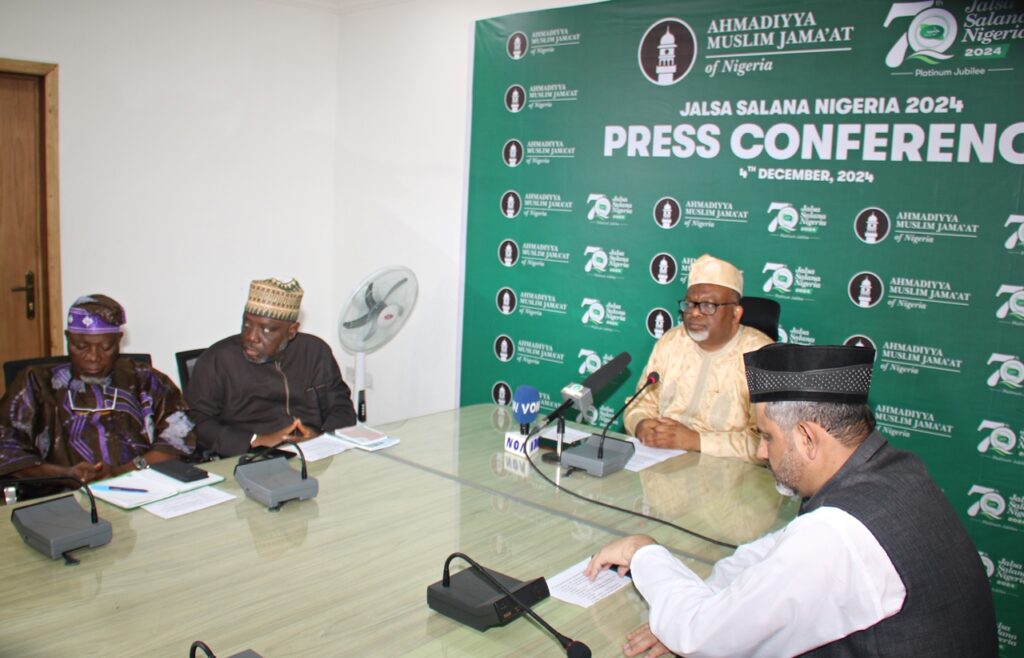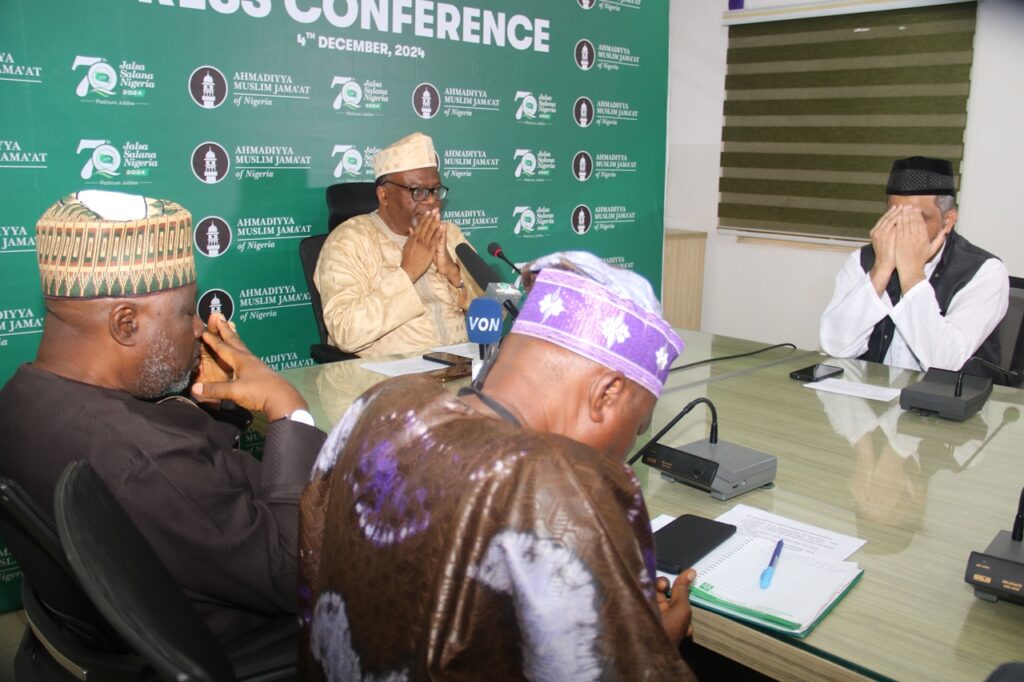Today, my address to you will be divided into three parts. First, I will take you on the memory lane of our journey in the last 70 counts of holding the annual Jalsa Salana in Nigeria. Secondly, I will discuss the features of this year’s Islamic gathering and the state of the Nation.
“Jalsa Salana Nigeria -70 years Down the Lane – Our Appreciation to Almighty Allah’’
Jalsa Salana is the Annual Convention of the Ahmadiyya Muslim Community initiated by the community’s founder, Hazrat Mirza Ghulam Ahmad (peace be upon him). Usually, the gathering spans over three days, beginning on Friday with the Friday Sermon. It derives its Islamic basis and rationale from the Qur’anic promulgation: “There is no good in many of their conferences except the conferences of such as enjoin charity, or goodness, or the making of peace among men. And whoso does that, seeking the pleasure of Allah, We shall soon bestow on him a great reward,” (Qur’an, Al-Nisā, Chapter 4 verse 115).
The very first Jalsa was held in Qadian, India, in 1891 and had 75 guests. The very next year, this grew to 327 and by 1908 approximately 2,500 guests were flocking to Qadian for the spiritual gathering. Within 100 years, from 1891-1991, Jalsa Salana Qadian grew from 75 to 66,000 guests.
In Nigeria, the journey towards the annual Islamic conference started in April, 1949, as a weekly meeting for enlightenment and discussions on pressing Islamic issues at the Ahmadiyya first central mosque number 21/23 Ojo Giwa street Lagos Island. 75 delegates attended the historic event, comprising of 50 males and 25 females, including children.
The first Amir to address the gathering was Maulana Naseef Saifi, an erudite Missionary, prolific writer, and motivational speaker, who became the Vice President of the Nigeria Union of Journalists and an Islamic presenter on the National Broadcasting Corporation, NBC.
Professor Ismail Balogun was the Jalsa officer coordinating reception, lectures, accommodation and feeding. Other officers and delegates are Missionary A. B Danmola, representing Ota Jamaat, Ogun state, Brother R.A Ola Oke from Ibadan Jamaat, Honourable Prince .M.A. Sanni from Ife Mission, Alhaji, Abdul Rahim Akinbode , A.R.A Oluwa from Ile Ife Ijede, Lagos, Mallam Murtala Habeebu from Ahmadiyya Village Agbede, in Auchi, Edo State , Alhaji B.B.Balogun, Alhaji O.H.Folorunso and Alhaji H.O. Sanyaolu. May Allah be pleased with them all.
Cooking and feeding of delegates were located at the Reclamation Road, the residence of Sister Nusirat Oniwinde, a member from Gold Coast Ghana and the residence of Alhaji Abdul Wahab Folawiyo. By 1966, the young Lajna (ladies) shifted the cooking to the Ahmadiyya Mission House, 45 Idumagbo Avenue, Lagos Island. Alhaja Princess Hadetu Idiat Kehinde M, Habeebu was in charge.
By 1967 under the Imarat of Maulana Alhaji Nasrudeen Ahmad, Jalsa Salana venue was moved from the mosque to a rented hall, the Saint Goerge Hall, Broad Street opposite Methodist Boys High School, Lagos Island. This was changed to J.K Randle Hall, near Island Hall, Onikan, Lagos in 1968.
In the early years, the venue of Jalsa salana was within the Lagos Island. The Nigerian Head of State General Yakubu Gowon was the first Nigerian leader to send a delegation to the Ahmadiyya annual Islamic gathering. He was represented by the Federal Commissioner for Works Alhaji Femi Okunnu. It was equally remarkable that the Pakistani High Commissioner to Nigeria attended the early Islamic conference, using the avenue to project the image of the Islamic country through audio -visual messages.
In subsequent gatherings, government officials at both the federal, state, local government and the traditional institutions have been attending the Ahmadiyya annual gatherings. Late Mallam Aminu Kano, Federal Commissioner for Health, Late Chief Bisi Onabanjo, late Governor Alhaji Lateef Jakande, Governor Olusegun Osoba, Late Emir of Borgu, Alhaji Kitoro, Late Emir of Kafanchan, were special guests of honour between 1970s and 1980s.
As the population of the delegates increased, the need for a spacious venue became imperative. The first movement of the Jalsa Salana -the annual Islamic conference occurred in 1969. Under the leadership of the then Amir, Maulana Fazl-Illahi Anweri, the conference was moved outside Lagos Island to the mainland of Lagos. The Muslim Teachers College, Randle Avenue Surulere played host to the gathering from 1969 to 1980.
The choice of the Muslim Teachers College was instructive. It was quite spacious for the large participants across Nigeria and the Ahmadiyya pioneering role in the education sector was a great advantage. The First Principal of the Teachers College was an Ahmadi Muslim, Dr R. A. Balti.
It was on record, that the first Muslim primary school, Fazl Omar Primary school, Elegbata, Lagos Island in 1932 was established by the Ahmadiyya Muslim Community along with secondary schools in Agege, (Lagos State) Ibadan, (Oyo state) Ogbagi Akoko, (Ondo state) Ayegunle Gbede, (Kogi state) Kano, (Kano State, Umaisha and Onda, (Nassarawa State).
By 1981, the unprecedented number of delegates to the Jalsa Salana has increased by manifold, the Muslim Teachers College, Surulere, has become grossly inadequate for the current needs. The then Amir, Maulana Ajmal Shahid, (Alias No Problem), longest expatriate Amir, relocated the conference venue to the permanent site and headquarters of the Ahmadiyya Muslim Jamaat of Nigeria at Ojokoro, Kilometre 27, Lagos – Abeokuta Expressway.
Ojokoro remained the venue of Islamic conference till 1990. The centenary celebration conference of the Ahmadiyya Muslim Community globally was held with the presence of the Fourth Khalifat, Hazrat Mirza Tahir Ahmad. Late Moshood Kashimawo Abiola, MKO then, Alhaji Liad Tella and Femi Abass, visited him, with the Concord Newspapers senior Journalists. Hazrat Mirza Tahir Ahmad, visited the then Head of State, General Ibrahim Babangida at the State House, Dodan Barracks.
After the centenary Jalsa Salana in Ojokoro, a new Amir Late Maulana Abdul Rasheed Agboola appointed by the Fourth Khalifah, moved the Islamic conference to Ilaro, the present site along Ilaro- Owode road. The leadership of Engineer Hussein Sunmonu, Late Alhaji Muhammad Mahmood Maishanu, Professor Moshuud Fasola, and Barrister Alatoye Folorunso Azeez presided over Jalsa Salana from 1990 till date.
For two years the annual Islamic conference was taken to Abuja for the 2008 and 2009. It was held at Hadeeqah Ahmad, kilometre 27 Abuja -Keffi expressway. Hazrat Khalifatul Masih V, Hazrat Mirza Masroor Ahmad, (Allah Be His Helper), was at the 2008 Abuja gathering.
Former Nigerian President Chief Olusegun Obasanjo was at the Ahmadiyya Muslim Jamaat of Nigeria centenary annual Jalsa salana in 2016. He appreciated the contributions of the Ahmadiyya Muslim Community in Nigeria and globally in his keynote address.
Other dignitaries who have attended the conference are the Vice President Professor Yemi Osinbajo, Governor Segun Osoba, Governor Rauf Aregbesola and Governor Dapo Abiodun. Islamic Scholars too had the opportunity to participate in the Ahmadiyya Islamic gatherings over the years.
Ahead of this year’s gathering, the Amir, embarked on courtesy visits to prominent Islamic scholars and traditional rulers across the country inviting them to come and share in the grace of ALLAH. He visited Sheikh Muideen Ajani Bello, Sheikh Abbas Zakariyyah in Ibadan and the Ejeh of Anka kingdom in Abuja, His Royal Highness Dr Abubakar Ahmad Sodiq Yakubu.
Features of the 70th Jalsa Salana
The theme of the 70th Jalsa Salana is: “And We Have Sent Thee (Muhammad) Not But As a Mercy For All People” (Q21.108). This is a Qur’anic declaration which is very instructive, as the Holy Prophet Muhammad (saw) is humanity’s noble specimen and perfect model in beauty and beneficence and in leadership for personal and national reformation and development. In all the various facets of his life and character, he stands unrivalled and an excellent exemplar for men to emulate and follow.
In this light, for both the leadership and followership strata in this country, it is apt for us to assess and explore the blessed life of the Holy Prophet (saw), who personified mercy in all aspects of life and about whom God declared in the Qur’an that: “There has indeed come to you a Messenger from among yourselves; grievous to him is that you fall into trouble; he is ardently desirous of your welfare; and to the believers he is particularly compassionate and Merciful,” (Qur’an, Al- Taubah, Chapter 9 verse 128).
The main highlights of the Islamic gathering are, Recitation of the Holy Quran, Praises of the Holy Prophet Muhammad (SAW), Message from the World Leader of the Ahmadiyya Community, Goodwill Messages from the Nigerian leaders, Lectures, Special Prayers/ Tahajjud for all.
We have invited the Nigerian President and Commander- In – Chief of the Armed Forces, President Bola Ahmed Tinubu, some Governors from the Northern and Southern parts of the federation, political and traditional leaders, Islamic Scholars as special guests.
The State of The Nation
Currently, we acknowledge the economic reforms of the present administration and bold decisions of the Nigerian Executives led by President Bola Ahmed Tinubu. The recent cheering news of the complete rehabilitation and full operation of the Portharcourt Refinery after 34 years is welcoming. However, it is regrettable that economic hardships are taken their tolls on average Nigerians but the political class are living in opulence and vagrant display of wealth. We have noticed that the President’s call for reduction in the cost of governance by the Ministers and Governors are not been yielded to.
The citizens are daily harassed by long convoys of official vehicles on the highways. Multiple taxations are still the order of the day. The public power supply – electricity is inadequate despite increase in tariffs and forced migration to Band A. In reality, the Nation is bleeding.
Advice to the Government
The political class must walk -the- talk over pronouncements on reduction of cost of governance. Ministers and Governors should reduce the size of their convoys.
Corrupt officials must be tried, convicted and punished accordingly as a deterrent to others. State governors who are yet to implement the payment of the minimum wage should expedite actions on payments.
Various government incentives to cushion the effects of economic hardship especially cost of food should be re-evaluated, made to work and address the sufferings of the poor.
Elites and privileged in the country should stop their high tastes for imported goods and service, patronise and buy home made goods and services.
At this year’s 70th Jalsa Salana, we have cause to thank Allah, for His Grace and look forward to welcome you all to the event. May Allah the Almighty bless you all. Amin.
Assalamu Alaikum Waramotullah Wabarakatuhu.
Wassalam
Alhaji (Barr.) Alatoye Folorunso Azeez
Amir (National Head) Ahmadiyya Muslim Jama’at of Nigeria.

